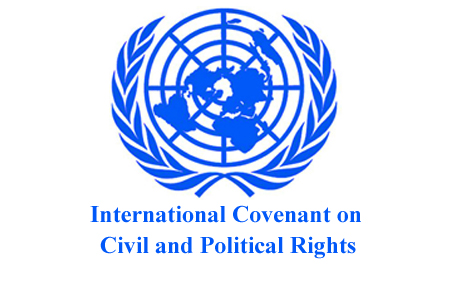International Covenant on Civil and Political Rights (hereinafter referred to as the Covenant) came into force on March 23, 1976.The purpose of the Covenant is the realization of the inherent dignity of human person through the provision of civil and political liberties and securities according to law. Pakistan signed the Covenant on April 17, 2008 and ratified it on June 23, 2010.
Basic structure of the Covenant:
The Covenant recognizes the right to self-determination of all peoples. State Parties are obliged to respect and to ensure that the rights established by the Covenant are enjoyed by all individuals, subject to their jurisdiction, without any distinction. These rights have to be given effect through legislative undertaking. In case of violation of a person’s rights or freedoms, he or she shall have an effective remedy determined and enforced by a competent authority provided for by the legal system of the State. Men and women have an equal right to the enjoyment of civil and political rights set forth in the Covenant. Under conditions of public emergency which threaten the life of the nation, States may derogate from certain Covenant obligations, after informing other State Parties, but under no circumstances should they derogate from the inviolable rights of individuals including the right to life, protection from torture, cruel, inhumane or degrading treatment or punishment, protection from slavery, protection from imprisonment upon breach of contract, protection from retrospective law, right to person-hood, and freedom of thought, conscience and religion.
The Covenant also provides protection from arbitrary arrest and detention. Human dignity has to be respected even for persons deprived of their liberty. Different classes of prisoners should be segregated from one another and special treatment should be accorded to certain prisoners subject to their age and legal status. Other rights conferred upon all persons under the Covenant include freedom of movement, right to habeas corpus, equality before law, right to fair trial and due process, right to privacy, freedom of expression, right of peaceful assembly, freedom of association, right to family life, fundamental rights of children such as their right to nationality and protection required by their status as a minor, right to participate in public affairs, right to vote and to run for public office, right to access public service, and rights of minorities.
Propaganda for war and incitement to discrimination, hostility or violence is prohibited by law under the Covenant. Any discrimination on grounds of race, color, sex, language, religion, political or other opinion, national or social origin, property, birth or other status is also strictly prohibited as all persons are entitled to equal protection of the law. All persons have the right to fully and freely enjoy their natural wealth, choose their place of residence and to determine their means of subsistence.
The Covenant also provides for the establishment of a Human Rights Committee. It is a body of independent experts whose function is monitoring of the implementation of the Covenant by State Parties. It is obligatory for all State Parties to submit regular reports to the Human Rights Committee. The Human Rights Committee reviews these reports, and provides recommendations for the purpose of addressing concerns raised by State Parties.
Pakistan’s reservations
At the time of ratification in 2010, Pakistan expressed reservations on Articles 3, 6, 7, 12, 13, 18, 19, 25 and 40 of the Covenant. Many States from around the world raised serious objections over these reservations. They submitted claims that these were impermissible on accounts of being contrary to the object and purpose of the Covenant. Pakistan decided to withdraw most of the reservations after European Union threatened to make Pakistan ineligible for the GSP Plus status. Consequently, reservations to Articles 6, 7, 12, 13, 18, 19 and 40 were wholly withdrawn, while reservations to Articles 3 and 25 were partially withdrawn on September 20, 2011.
The modified text of the reservations on Articles 3 and 25 is as follows:
Article 3
‘The Government of the Islamic Republic of Pakistan declares that the provisions of Article 3 of the International Covenant on Civil and Political Rights shall be so applied as to be in conformity with Personal Law of the citizens and Qanoon-e-Shahadat’.
Article 25
“The Government of the Islamic Republic of Pakistan states that the application of Article 25 of the International Covenant on Civil and Political Rights shall be subject to the principle laid down in Article 41 (2) and Article 91 (3) of the Constitution of Pakistan.”
Pakistani national laws relevant to the Covenant include the 1973 Constitution, Prisons Act, 1894, Rules for the Superintendence and Management of Prisons in Pakistan (Pakistan Prison Rules, 1978), Pakistan Penal Code, 1860 and Protection of Pakistan Act, 2014.


